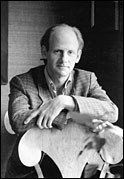Protecting the public good
A lecture held earlier this month likely would have drawn a good crowd under most circumstances. Entitled "Health Care as a Human Right," it focused on an issue that has preoccupied Canadians for decades.
 Philosopher and author John Ralston Saul
Philosopher and author John Ralston SaulPHOTO: Beverley Rockett |
|
However, the line-up outside the Fieldhouse auditorium on November 7 stretched for a couple of hundred metres through the Stephen Leacock Building's hallways. Indeed, it was standing room only to hear His Excellency John Ralston Saul deliver the 25th annual Osler Memorial Lecture.
As one of the few philosopher celebrities in Canada, husband of Canada's Governor General Adrienne Clarkson, and an acclaimed novelist, Saul spoke about issues ranging from mad cow disease to the pricing policies of pharmaceutical companies.
He dispensed with the purported topic of his lecture almost from his first words.
"There is, in my mind, no arguable case that health care is anything other than a human right," he said.
That out of the way, Saul went on to attack the kinds of thinking -- "mistaking ourselves," in his words -- that allow the Western world to not treat health care as a human right. Referring frequently to the words of Sir William Osler, and his own writings, Saul presented an argument that self-interest and overspecialization has kept society from adequately addressing health care issues.
"The idea of public health requires an integrated view of the public good," stressed Saul.
According to Saul, one of the major reasons for the spiraling cost of health care is increasingly high costs for medicine. For this, Saul blamed the pharmaceutical companies, whose interests are not necessarily better treatments for disease.
"We're not dealing with health care -- we're dealing with a crude market structure interested in making royalties from the ownership of ideas," he said.
This system impedes progress, he said. New ideas make old ideas -- ideas that are valuable property to a corporation -- obsolete. It is not in a drug company's best interest to regularly make their products outdated, as they lose the return on their investment.
Managers and management theory did not escape his criticism either. For Saul, management theory has been working on 19th-century principles that became outdated more than 80 years ago.
He pointed to Ontario's firing of thousands of nurses, only to have to hire them back later at a higher cost, as a typical shortcoming of management thinking.
"There is never memory in management, there is no yesterday," said Saul, to laughter.
He said that a larger system, geared to more people, is more cost efficient than a specialized system. The United States spends more on health care because it delivers to only specialized segments of the population.
"The harder you drive to efficiency the fewer services you get for a higher cost," he said.
Management types might sniff, "Well, what does he know about management, philosophizing from Rideau Hall?" Prior to his writing career, Saul founded an investment firm and worked as a policy advisor to Petro-Canada.
However much his lecture focused on money issues, it was at heart a talk about ethics. The philosopher stated at the outset that though the concept of rights remains a tricky one, he believes that rights -- or the public good -- is something that has to be reconquered and re-asserted every day.
Every compromise society makes in the name of efficiency -- spending more on pharmaceuticals, cutting back on nursing, requiring medical students to take on crushing debt loads -- is a compromise that leads to, in Saul's words, "the public evil."
"The public good -- and health care -- is practical, everyday stuff," he said.

